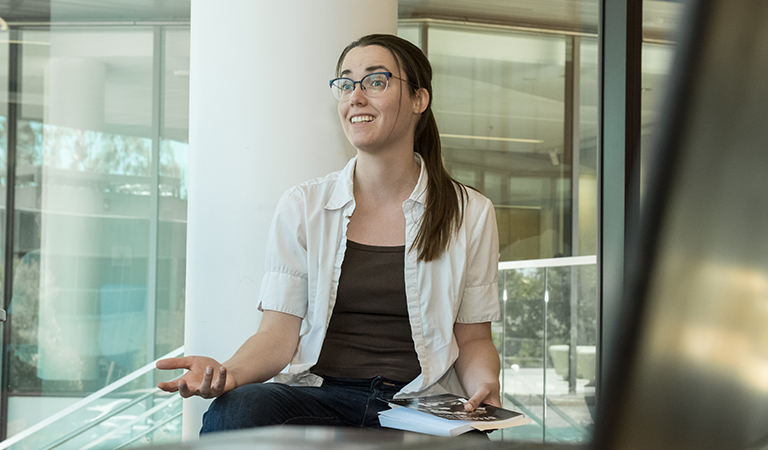CS REU Explores the Limits of Intelligent Systems
April 13, 2023
When Harvey Mudd College computer science professor Xanda Schofield ’13 was a student at HMC, she was a member of computer science professor Bob Keller’s lab. Funded by a National Science Foundation Research Experiences for Undergraduates (REU) grant, her research focused on developing new algorithms for Impro-Visor, a software project that composed music and supported musicians in experimenting with jazz improvisation and composition. The Impro-Visor team’s work that summer led to her first published paper and her first steps towards a future career in research.
The Computer Science Department’s REU site is now in its 19th year, thanks to support from the NSF and efforts over the past two decades from numerous members of the department. The grant has been renewed for summers 2023-2025, which is exciting news on its own. But for Schofield, who participated in writing the REU grant for the first time this year alongside co-PI Prof. George Montañez, it’s also personally meaningful.
“I’m a big believer in the impact of REU experiences on future graduate school aspirations because Harvey Mudd’s REU site was part of my journey to becoming a professor,” Schofield says. “Prof. Bob Keller was a mentor in how to write papers, how to tackle unusual problems across disciplines and how to push forward in a project when something wasn’t working. I know that without the experience of being an REU student in his lab, I wouldn’t be where I am today.”
With this REU, HMC CS faculty members will receive funding to support approximately 10 students per summer for the next three years on projects with the theme “Exploring the Limits of Intelligent Systems.” Planned projects span computer science theory and practice, ranging from very simple to very complex models of information and computation, and touching on software, hardware and the people who use technology. “We take a broad view of what an intelligent system is, so our projects cover a wide variety of topics, matching the diverse interests of the faculty in our department,” Schofield says. “However, a theme that unites a lot of our work is understanding where systems that analyze data and make decisions stop working, and (ideally) what we can do about it.”
The renewal of the grant centers a recurring theme that Schofield finds to be exceptional in her colleagues’ and students’ research: a curiosity about boundaries between where things work and where they don’t.
“Sometimes this is the intersection of two different sets of constraints and ideas,” she says, “like Professor Arthi Padmanabhan’s work on making machine learning work on small low-power devices, or my work on making computational tools for text help answer questions from humanists or computational social scientists. Other times, this is thinking about when systems do and don’t work, whether thinking about the theoretical framework of what makes bias in a machine learning system informative (like in Professor George Montañez’ AMISTAD lab) or the very practical work of understanding why modern computer vision systems that try to make sense of videos don’t pay attention to the same things people do when we watch videos (like Professor Calden Wloka’s Lab for CATS) or the in-between challenges of trying to extract practical information about how complex programs are (from Professor Lucas Bang’s group’s work on Metrinome).”
A goal of this REU is to bring the “most compelling aspects of graduate school to undergrads.” Accordingly, the CS Department has a tradition of making sure that each 10-week program includes all of the best parts of graduate school: focusing on one research project, diving into new ideas with peers, listening to talks from people in totally different areas, and building up confidence and ownership of expertise in a project. Schofield says, “As advisors, we want students taking the lead to develop the ideas for these projects. Over and over again, we’ve seen the amazing things our students can do when they’re given that space and support to make something totally new. We’re very excited to do that again this year and beyond.”
